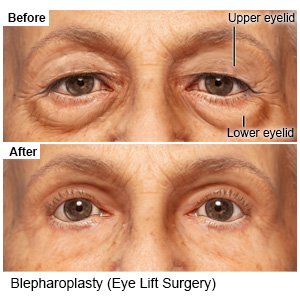Eye Lift
Medically reviewed by Drugs.com. Last updated on Aug 4, 2025.
What do I need to know about an eye lift?
Eye lift, or blepharoplasty, is surgery to fix a sagging, drooping, or baggy eyelid. The upper and lower eyelids may be fixed.
 |
How do I prepare for surgery?
Your surgeon will talk to you about how to prepare for surgery. He or she may tell you not to eat or drink anything after midnight on the day of your surgery. He or she will tell you what medicines to take or not take on the day of your surgery. You may be given antibiotics before your surgery starts. Arrange to have someone drive you home and stay with you.
What will happen during surgery?
- You may be given local anesthesia to numb the surgery area. You may also be given sedation. With local anesthesia and sedation, you may feel pressure or pushing, but you should not feel any pain. You may instead be given general anesthesia to keep you asleep during surgery.
- Your surgeon will make cuts in the natural folds of your eyelid with a blade or laser. Extra skin and fat will be removed. Your surgeon may also tighten the eyelid or change its position. The cuts will be closed with tiny stitches, medical tape, or medical glue.
What will happen after surgery?
Eye drops and ointment may be applied to your eye. These will help keep your eye moist while your eyelid heals. They will also help prevent infection. You may expect watery eye, double vision, and sensitivity to light. Your eye may be swollen and numb.
What are the risks of surgery?
- You may have temporary numbness of your eyelid. Your eye may become dry and irritated. Your eyelid may be red and swollen for weeks or months. You may have blurry or double vision. You may develop scars. Your eye muscles may be damaged. You may have bleeding or bruising in your eye, which can lead to blindness.
- Your eyelid may not close all the way. Your eyelid may look different than you expected. Your eye may look round, different from the other eye, or sunken. Ptosis (drooping) or webbing (folding of the upper eyelid skin near your nose) may occur.
Care Agreement
You have the right to help plan your care. Learn about your health condition and how it may be treated. Discuss treatment options with your healthcare providers to decide what care you want to receive. You always have the right to refuse treatment. The above information is an educational aid only. It is not intended as medical advice for individual conditions or treatments. Talk to your doctor, nurse or pharmacist before following any medical regimen to see if it is safe and effective for you.© Copyright Merative 2025 Information is for End User's use only and may not be sold, redistributed or otherwise used for commercial purposes.
Further information
Always consult your healthcare provider to ensure the information displayed on this page applies to your personal circumstances.
